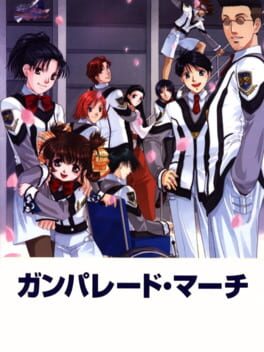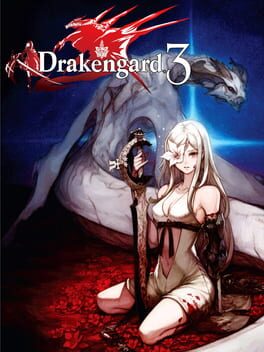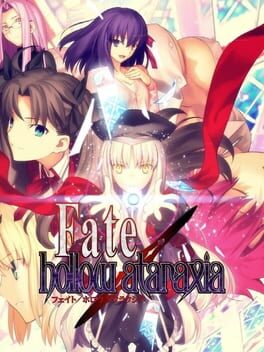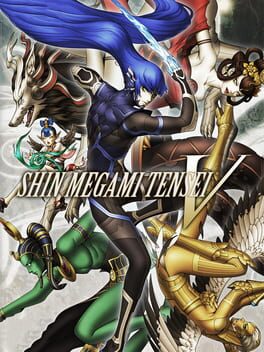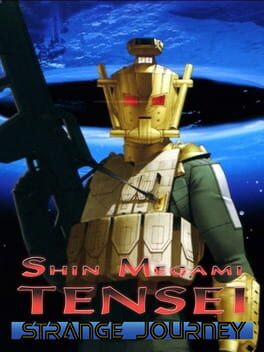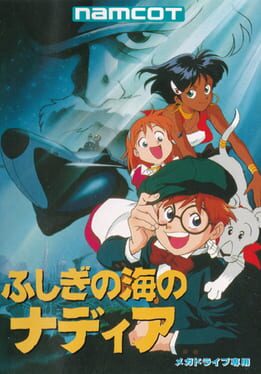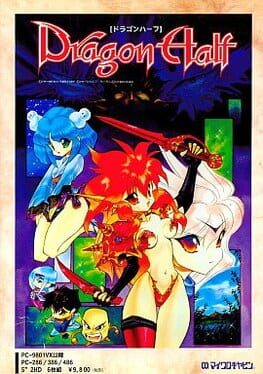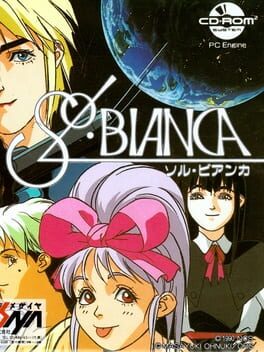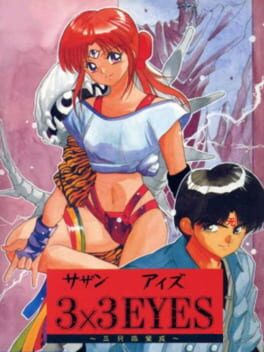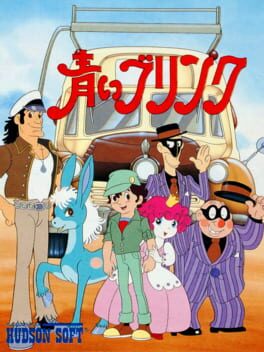Thac
6 reviews liked by Thac
Gunparade March
2000
This is gonna be a long post but I want to talk about the more unique aspects of this game that aren't the game mechanics like the emotion system it has, how unique and impressive the AI is and so on that I've already seen people talk about. Most people into "strange" PS1-era video games have heard of this one before. It is a bit of an infamous title due to still being the only video game ever to win the Seiun Sci-fi award and at the time it was just made by a bunch of random staff that somehow made a mecha-focused game leagues above any of its competitors such as Front Mission, SRW, Sakura Wars and so on. It is also sometimes mentioned in relation to Muv-Luv and 13 Sentinels. The former has basically the same alternate-history concept and the way it handles a certain SF trope is very similar but otherwise they are quite different. With the latter, it is probably the primary influence (alongside Please Save My Earth and Megazone 23) which is pretty hilarious as one of the most common complaints with 13S is that it "doesn't do anything original" despite the fact that 90% of the people who say that don't even know what those three series are.
The influence of GPM on 13S isn't a simple plot point or anything like that though and much deeper than you would expect. Take 13S and remove the mystery files and imagine if every story in the story section was totally randomized. Not only that, but imagine the gameplay of 13S except it's not piss easy and it's incredibly complicated. But enough about other games, GPM has had a pretty legendary status as a long untranslated game. I have played through the game four times including the tutorial playthrough and it has been nearly a year.
First off, similar to 13S and Persona 3 the game is split into two sections being the social sections and the battle system. A good 90% of the game takes place in the school section while the rest of it is "SRPG" stuff. This may not sound like anything special but, if you ever wanted the social sections to tie into the battles in those previously mentioned games this is what you are looking for. Pretty much everything you do in the social sections matter, and each playthrough will be a different experience. The games social-link equivalent does not give you simple stat boosts or anything like that, almost every single classmate you have gives you entire game mechanics. Ranging from being able to see into peoples hearts and seeing who likes who to being able to use the Shining Finger from G Gundam, to being able to increase your social status and forcing your classmates to listen to you. Not only that, but there is perma-death. This isn't some FE style perma-death though. When a classmate dies, they hold an entire funeral for him and the way all the other characters act changes. Every single death matters. If you liked the aspect of not being able to control your classmates in Persona 3's battle section well, this is like that but a million times more complicated. The more someone likes you, the more likelier they are to help you during battle. This isn't all however, there are as many negative aspects as there are positive aspects to it. So if you are thinking of trying to be best friends with literally everyone, I learned the hard way that this is not a viable strategy. Most of the cast has beef with each other so you have to experience and choose who you want to get close to. For example, Katou is very useful and charming but getting close to her makes Kariya hate you because he feels jealous of your character. Kariya is disabled and on a wheelchair who needs help a lot of the time. Helping him up the stairs and stuff would normally make others sympathize with you more and see you as a helpful person, but if he hates you you lose this ability. On the other hand, getting close to a psychopath like Akane puts a rift between you and the rest of the cast. Moreover, the game is filled with beginners traps. If you get close to Mai Shibamura, the "main heroine" of the game you lose access to pretty much everyone else as they all hate her. The tradeoff is that Mai is easily the best character in the game and simply better than everyone else, despite this fact though if you get close to her it also locks you into one of the few scripted battles that a beginner has next to no chance of winning. There's something like this with every single character which is what makes it stand out so much to me. You have next to no control over how the world develops in the game, and you have to manually learn who likes who and vice versa by talking to them.
However, the more you play through the game the more you acquire this "knowledge" which leads you to be able to control the world more. This in turn is a requirement for the true ending in game. Once you fullfill the true ending requirements and "learn about the truth of the world", you start being referred to as a god and all your classmates start being afraid of you. This is another very unique aspect of the game, counting things like scripted bad endings there are around a dozen endings in the game. There are six normal endings depending on how you perform as a soldier, however besides the true ending most of the endings are the same besides the boosters they give for your next playthrough. The true ending though, is anything but simple. Pretty much the entire dialogue in the game changes once you fulfill the requirements for it. The requirements for it are harsh as well, you have to kill over 300 Genjuu (the beta/kaiju/alien equivalent of the game) and make sure no one among the 23 characters in the cast (yes, including your teachers) dies.
Oh yeah, the story. If you dislike long stretches of plot infodumps that RPGs tend to have, this is your game. Possibly the epitome of show don't tell. There is an overarching story but it takes a background to the point of the game, which is that the way you connect the strange happenings of the game is the "real story". Essentially, your experience while playing it matters more than the explanation to things. That isn't to say they don't explain anything but without spoiling much this game is unpredictable to say the least. Even with game mechanics, I've never seen any other mecha SRPG have war-time tax on simple items in the store. You have to pay fucking tax in this game. Simply put, this isn't a game that revolves around twists. The amount of stuff you can do is virtually limitless, if you want to become the commander of your platoon you can do it. If you think the battle system is bad, you can take a job that doesn't involve piloting such as being an engineer and sit out and skip all of the battles. Hell, if you want you can NEET it out too, not working at all and being lazy is an option as well. Planning an assassination against government officials, working for the black market, learning the origin behind the robots you pilot, "siding with the aliens", getting real close to the cat that suspiciously has god-tier stats, cursing your classmates and setting them up to die, working out like crazy and punching aliens while wearing your piloting suit and so on. All this stuff I mentioned isn't even half of it, I recommend not looking up many guides as learning that every single action has a consequence is one of the things I liked about the game. Oh yeah, there is an "Illusion" meter in the game that is basically a schizophrenia stat. You should absolutely grind that to see some wild shit.
So in the end how does all of this come together? Well, barely. The music is very underwhelming. The visuals of the games besides the battles are in the negatives. A lot of the character scenarios feel unfinished, and it doesn't help that for some reason all the social link equivalents are in randomized order for the most part. I would say the game is complete as it is but, if you go into it expecting a set beginning and an end you will be disappointed. A lot of stuff was cut as well, going into minor spoiler territory here there are 5+1(the tutorial chara) playable characters. Originally, every single character was meant to be playable. You can still play as every character through a cheat code but all of their scenarios are unfinished and insanely glitchy. Moreover, all the ED cutscenes have a bunch of CGs that you don't see in game: all content that was cut and reproduced as an audio drama. Said audio drama is largely unavailable, I had to physically buy most of the discs and uploaded what I have on YT but I'm still missing the last two.
There's a ton of stuff about the game that I haven't mentioned due to spoilers. Some crucial game mechanics, the meta element that the entire game revolves around, etc. One final note is that if you're the type that lacks reading comprehension and whines about Muv-Luv and similar games being fascist then steer clear of this game because it makes ML nationalism seem like a joke.
Gunparade March lived up to the hype for me and I still think about it every day but, I feel like a lot of people won't really like it much. It really is a lightning in a bottle tier game. I'm hoping LOOP8 will be good but it isn't looking that great and the other sequels are not great. Still, if you like any of the aforementioned games or if anything I said about it sounds interesting it is absolutely worth checking out in the case that it gets translated. Just know that whatever the game seems like to you, it's probably nothing like that in reality.
Drakengard 3
2013
Fate/Hollow Ataraxia
2014
This feels like a story I will grow on to cherish for eons, its sheer earnestness kinda blew me away and I had a tear running down my cheek during the entire last stretch, which is my favourite ever. Absolutely what I needed to hear.
Bazett is truly the Joker for VN readers.
Spoilers //
Special note has to go to its handling of Shirou's legacy and how the entire thing is essentially about a protagonist who was inspired by his deeds, which is incredibly fitting from a meta perspective for an epilogue like this one.
Shin Megami Tensei V
2021
Before playing it I thought that I would hate it, how ironic since it is now my favorite Shin Megami Tensei title.
Superb dungeon crawling with some of the best dungeons of the series. A really solid story and lore, and some of the best characters you could get from these games.
I absolutely loved exploring the Schwarzwelt and its secrets.
Oh, and Eridanus wasn't that hard and clearly is one of the best sectors.
Superb dungeon crawling with some of the best dungeons of the series. A really solid story and lore, and some of the best characters you could get from these games.
I absolutely loved exploring the Schwarzwelt and its secrets.
Oh, and Eridanus wasn't that hard and clearly is one of the best sectors.
Shin Megami Tensei V
2021
Themes of gigantic proportions with the original metaphysical conflict between order and chaos as a guideline. Which one is preferable for a better world, now that the old one has lost its God? Consciences are finally freed from the yoke of divine omnipotence. Where should we go now that we have lost our guide?
All of this goes far beyond our human finitude but, and this is where SMTV shines in its philosophical presentation: we come back time and time again to discuss man's place in this cosmic balance. This is how the game manages to keep its feet on the ground to lay the foundations not only of its plot but also simply of its engagement with the player.
Each character, however obsessed with his ideals, faces at least once a period of deep questioning either by slow introspection or by coming face to face with the consequences of his choices. God dead, what becomes of man? And, as best as they can, beyond good and evil, the characters look for their answer... SMTV has not made any mistake in the description of this very Nietzschean process. The death of God is not an end, it is the beginning of human transformation. Man is a bridge, a rope between "subhuman" and something else, something greater (or rather the chasm that separates them...). He then goes through three essential stages for his advent: the accumulation of knowledge, without reflection (monologue of the prologue, prelude of the Armageddon); the destruction of the whole of knowledge, of what was held to be true (the great war of 18 years ago and its final deicide); finally, the rebirth ex nihilo, from nothing. This last phase of creation, pure of new knowledge and a new morality, is perfectly embodied by the existence of the Nahobino. This is why its existence is taboo in itself.
There might be avenues for reflection too on the slow decadence of the human being, relentlessly crushed by society and a city that never stops growing. The enormous Tokyo map, the bland everyday life at high school, only punctuated by bullying and fear of abduction...
The exploration is awesome. The size and quantity of elements in each level are so huge that managing to keep consistency in the inimitable aesthetic and gameplay is a huge achievement. Because the demons which populate this Tokyo devastated of all human life are well alive, in every possible aspect. Their artistic diversity (Masayuki Doi has done a monumental work on the designs), the fact that they each have their unique animation, their completely offbeat humor (the fact that it goes against all human logic and that you have to decipher it to recruit them...), and their quantity! Their total number seems infinite (the possibilities of fusion). In the end, even if man is the main subject of SMTV, it is through our interactions with the demons that we become aware of certain things that would bring us closer to a definition of "life", "humanity"... What does it mean to be alive? You have to ask the myriad of deities, dragons, fairies, snakes, and other mythological creatures that occupy the Da'at. The latter term, which refers to the hidden sefira of the Tree of Life in Kabbalah, also refers to knowledge, self-awareness, and thus the ability to make decisions for the good of all. Quite fitting.
SMTV shines again in its huge architecture, in these dungeons in which we feel tiny and lost in front of more and more gigantic bosses. I am not particularly familiar with the districts of Tokyo so I may have missed some easter eggs referring to the real-life locations. However, it was a pleasure to discover the city this way: Akihabara, Sukiyabashi, Ginza, all the famous districts are there in a way that amplifies, even more, the mystical side of the adventure.
The cinematography and the mise-en-scène of the cinematics were simply epic! Although the quest is far from being an epic: no initiatory quest, no heroism or sentimentality, no power of friendship, etc.
And the game is hard, very hard (for me anyway). It's not only about complicated fights, which is an easy problem to solve in an RPG that allows us to gain experience and increase our stats. Atlus is, as usual, much crueler than that. SMTV is a marathon: the fights are numerous, very numerous. And there is no question of asking our companions to resurrect us: our death is equivalent without delay to the fateful game over. It is up to us and only us to build our team by convincing our opponents to join our camp, an additional pressure. And then to fuse them strategically.
The members of our party, whose statistics are entirely customizable, only have a limited number of skills. This means that you have to be willing to make many sacrifices from the long list of available spells. Knowing that a deleted skill is permanently deleted. A mistake in our path can be very disabling in the long run.
2 points to lighten this up:
- The combat system is great: touching an enemy's weakness gives you an extra turn, attacking him on one of his strengths makes you lose one. This is also true for your opponent. The tactic is then to gain turns while reducing the opponent's turns.
- And the fact that there are so many side quests and elements to explore in parallel means that you rarely have to "farm the hard way".
All of this goes far beyond our human finitude but, and this is where SMTV shines in its philosophical presentation: we come back time and time again to discuss man's place in this cosmic balance. This is how the game manages to keep its feet on the ground to lay the foundations not only of its plot but also simply of its engagement with the player.
Each character, however obsessed with his ideals, faces at least once a period of deep questioning either by slow introspection or by coming face to face with the consequences of his choices. God dead, what becomes of man? And, as best as they can, beyond good and evil, the characters look for their answer... SMTV has not made any mistake in the description of this very Nietzschean process. The death of God is not an end, it is the beginning of human transformation. Man is a bridge, a rope between "subhuman" and something else, something greater (or rather the chasm that separates them...). He then goes through three essential stages for his advent: the accumulation of knowledge, without reflection (monologue of the prologue, prelude of the Armageddon); the destruction of the whole of knowledge, of what was held to be true (the great war of 18 years ago and its final deicide); finally, the rebirth ex nihilo, from nothing. This last phase of creation, pure of new knowledge and a new morality, is perfectly embodied by the existence of the Nahobino. This is why its existence is taboo in itself.
There might be avenues for reflection too on the slow decadence of the human being, relentlessly crushed by society and a city that never stops growing. The enormous Tokyo map, the bland everyday life at high school, only punctuated by bullying and fear of abduction...
The exploration is awesome. The size and quantity of elements in each level are so huge that managing to keep consistency in the inimitable aesthetic and gameplay is a huge achievement. Because the demons which populate this Tokyo devastated of all human life are well alive, in every possible aspect. Their artistic diversity (Masayuki Doi has done a monumental work on the designs), the fact that they each have their unique animation, their completely offbeat humor (the fact that it goes against all human logic and that you have to decipher it to recruit them...), and their quantity! Their total number seems infinite (the possibilities of fusion). In the end, even if man is the main subject of SMTV, it is through our interactions with the demons that we become aware of certain things that would bring us closer to a definition of "life", "humanity"... What does it mean to be alive? You have to ask the myriad of deities, dragons, fairies, snakes, and other mythological creatures that occupy the Da'at. The latter term, which refers to the hidden sefira of the Tree of Life in Kabbalah, also refers to knowledge, self-awareness, and thus the ability to make decisions for the good of all. Quite fitting.
SMTV shines again in its huge architecture, in these dungeons in which we feel tiny and lost in front of more and more gigantic bosses. I am not particularly familiar with the districts of Tokyo so I may have missed some easter eggs referring to the real-life locations. However, it was a pleasure to discover the city this way: Akihabara, Sukiyabashi, Ginza, all the famous districts are there in a way that amplifies, even more, the mystical side of the adventure.
The cinematography and the mise-en-scène of the cinematics were simply epic! Although the quest is far from being an epic: no initiatory quest, no heroism or sentimentality, no power of friendship, etc.
And the game is hard, very hard (for me anyway). It's not only about complicated fights, which is an easy problem to solve in an RPG that allows us to gain experience and increase our stats. Atlus is, as usual, much crueler than that. SMTV is a marathon: the fights are numerous, very numerous. And there is no question of asking our companions to resurrect us: our death is equivalent without delay to the fateful game over. It is up to us and only us to build our team by convincing our opponents to join our camp, an additional pressure. And then to fuse them strategically.
The members of our party, whose statistics are entirely customizable, only have a limited number of skills. This means that you have to be willing to make many sacrifices from the long list of available spells. Knowing that a deleted skill is permanently deleted. A mistake in our path can be very disabling in the long run.
2 points to lighten this up:
- The combat system is great: touching an enemy's weakness gives you an extra turn, attacking him on one of his strengths makes you lose one. This is also true for your opponent. The tactic is then to gain turns while reducing the opponent's turns.
- And the fact that there are so many side quests and elements to explore in parallel means that you rarely have to "farm the hard way".
